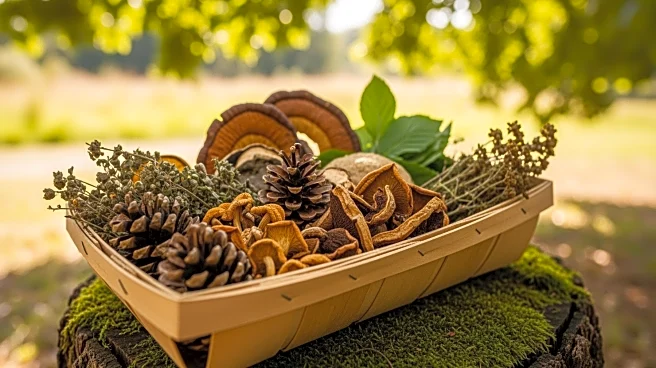What's Happening?
Jacob Williams, a forester with the University of Georgia Extension, is promoting the cultivation of non-timber forest products such as ginseng, goldenseal, and mushrooms to add value to woodlands without
cutting trees. Williams emphasizes the importance of sustainable practices in growing these crops, which can connect landowners to cultural heritage and provide economic benefits. He uses a wild simulated method to grow ginseng, which mimics natural growth conditions and requires minimal management. The process takes 8-10 years for the ginseng root to mature, and the root can sell for hundreds of dollars per pound. Williams highlights the role of the U.S. Fish and Wildlife Service in managing ginseng programs, which facilitates market access for growers.
Why It's Important?
The cultivation of non-timber forest products offers a sustainable alternative to traditional forestry practices, allowing landowners to generate income while preserving forest ecosystems. This approach can diversify agricultural income sources and reduce reliance on timber harvesting, which can be environmentally damaging. The demand for products like ginseng, driven by international markets such as China, presents economic opportunities for U.S. growers. Additionally, these crops have cultural significance, connecting growers to historical practices and regional cuisines. By promoting sustainable forest farming, Williams is contributing to the conservation of biodiversity and the protection of natural habitats.
What's Next?
Landowners interested in forest farming may explore partnerships with local restaurants and farmers markets to sell their products. The development of value-added products, such as tinctures and salves, could enhance profitability. As awareness of non-timber forest products grows, there may be increased interest in educational programs and resources provided by institutions like the University of Georgia Extension. The Appalachian Forest Farmer Coalition and similar organizations could play a role in supporting growers and advocating for sustainable practices. Future research and policy initiatives may focus on expanding market access and improving cultivation techniques.
Beyond the Headlines
The promotion of non-timber forest products highlights broader environmental and cultural implications. Sustainable forest farming can contribute to carbon sequestration and climate change mitigation by preserving tree cover. It also supports biodiversity by maintaining habitats for various species. Culturally, these practices revive traditional knowledge and connect communities to their heritage, fostering a sense of identity and continuity. As interest in forest farming grows, there may be ethical considerations regarding the commercialization of culturally significant plants and the need to balance economic interests with conservation goals.









